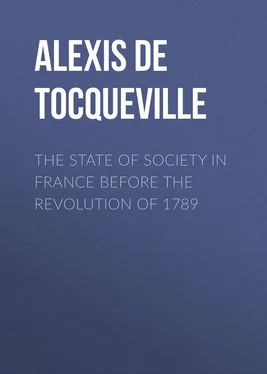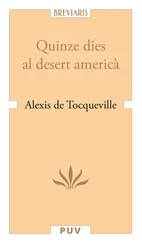Alexis de Tocqueville - The State of Society in France Before the Revolution of 1789
Здесь есть возможность читать онлайн «Alexis de Tocqueville - The State of Society in France Before the Revolution of 1789» — ознакомительный отрывок электронной книги совершенно бесплатно, а после прочтения отрывка купить полную версию. В некоторых случаях можно слушать аудио, скачать через торрент в формате fb2 и присутствует краткое содержание. Жанр: foreign_prose, История, foreign_edu, foreign_antique, на английском языке. Описание произведения, (предисловие) а так же отзывы посетителей доступны на портале библиотеки ЛибКат.
- Название:The State of Society in France Before the Revolution of 1789
- Автор:
- Жанр:
- Год:неизвестен
- ISBN:нет данных
- Рейтинг книги:3 / 5. Голосов: 1
-
Избранное:Добавить в избранное
- Отзывы:
-
Ваша оценка:
- 60
- 1
- 2
- 3
- 4
- 5
The State of Society in France Before the Revolution of 1789: краткое содержание, описание и аннотация
Предлагаем к чтению аннотацию, описание, краткое содержание или предисловие (зависит от того, что написал сам автор книги «The State of Society in France Before the Revolution of 1789»). Если вы не нашли необходимую информацию о книге — напишите в комментариях, мы постараемся отыскать её.
The State of Society in France Before the Revolution of 1789 — читать онлайн ознакомительный отрывок
Ниже представлен текст книги, разбитый по страницам. Система сохранения места последней прочитанной страницы, позволяет с удобством читать онлайн бесплатно книгу «The State of Society in France Before the Revolution of 1789», без необходимости каждый раз заново искать на чём Вы остановились. Поставьте закладку, и сможете в любой момент перейти на страницу, на которой закончили чтение.
Интервал:
Закладка:
Many will perhaps accuse me of showing in this book a very unseasonable love of freedom—a thing for which it is said that no one any longer cares in France.
I shall only beg those who may address to me this reproach to consider that this is no recent inclination of my mind. More than twenty years ago, speaking of another community, I wrote almost textually the following observations.
Amidst the darkness of the future three truths may be clearly discovered. The first is, that all the men of our time are impelled by an unknown force which they may hope to regulate and to check, but not to conquer—a force which sometimes gently moves them, sometimes hurries them along, to the destruction of aristocracy. The second is, that of all the communities in the world those which will always be least able permanently to escape from absolute government are precisely the communities in which aristocracy has ceased to exist, and can never exist again. Lastly, the third is, that despotism nowhere produces more pernicious effects than in these same communities, for more than any other form of government despotism favours the growth of all the vices to which such societies are specially liable, and thus throws an additional weight on that side to which, by their natural inclination, they were already prone.
Men in such countries, being no longer connected together by any ties of caste, of class, of corporation, of family, are but too easily inclined to think of nothing but their private interests, ever too ready to consider themselves only, and to sink into the narrow precincts of self, in which all public virtue is extinguished. Despotism, instead of combating this tendency, renders it irresistible, for it deprives its subjects of every common passion, of every mutual want, of all necessity of combining together, of all occasions of acting together. It immures them in private life: they already tended to separation; despotism isolates them: they were already chilled in their mutual regard; despotism reduces them to ice.
In such societies, in which nothing is stable, every man is incessantly stimulated by the fear of falling and by eagerness to rise; and as money, while it has become the principal mark by which men are classed and distinguished, has acquired an extraordinary mobility, passing without cessation from hand to hand, transforming the condition of persons, raising or lowering that of families, there is scarcely a man who is not compelled to make desperate and continual efforts to retain or to acquire it. The desire to be rich at any cost, the love of business, the passion of lucre, the pursuit of comfort and of material pleasures, are therefore in such communities the prevalent passions. They are easily diffused through all classes, they penetrate even to those classes which had hitherto been most free from them, and would soon enervate and degrade them all, if nothing checked their influence. But it is of the very essence of despotism to favour and extend that influence. These debilitating passions assist its work: they divert and engross the imaginations of men away from public affairs, and cause them to tremble at the bare idea of a revolution. Despotism alone can lend them the secrecy and the shade which put cupidity at its ease, and enable men to make dishonourable gains whilst they brave dishonour. Without despotic government such passions would be strong: with it they are sovereign.
Freedom alone, on the contrary, can effectually counteract in communities of this kind the vices which are natural to them, and restrain them on the declivity along which they glide. For freedom alone can withdraw the members of such a community from the isolation in which the very independence of their condition places them by compelling them to act together. Freedom alone can warm and unite them day by day by the necessity of mutual agreement, of mutual persuasion, and mutual complaisance in the transaction of their common affairs. Freedom alone can tear them from the worship of money, and the petty squabbles of their private interests, to remind them and make them feel that they have a Country above them and about them. Freedom alone can sometimes supersede the love of comfort by more energetic and more exalted passions—can supply ambition with larger objects than the acquisition of riches—can create the light which enables us to see and to judge the vices and the virtues of mankind.
Democratic communities which are not free may be rich, refined, adorned, magnificent, powerful by the weight of their uniform mass; they may contain many private merits—good fathers of families, honest traders, estimable men of property; nay, many good Christians will be found there, for their country is not of this world, and the glory of their faith is to produce such men amidst the greatest depravity of manners and under the worst government. The Roman Empire in its extreme decay was full of such men. But that which, I am confident, will never be found in such societies is a great citizen, or, above all, a great people; nay, I do not hesitate to affirm that the common level of the heart and the intellect will never cease to sink as long as equality of conditions and despotic power are combined there.
Thus I thought and thus I wrote twenty years ago. I confess that since that time nothing has occurred in the world to induce me to think or to write otherwise. Having expressed the good opinion I had of Freedom at a time when Freedom was in favour, I may be allowed to persist in that opinion though she be forsaken.
Let it also be considered that even in this I am less at variance with most of my antagonists than perhaps they themselves suppose. Where is the man who, by nature, should have so mean a soul as to prefer dependence on the caprices of one of his fellow-creatures to obedience to laws which he has himself contributed to establish, provided that his nation appear to him to possess the virtues necessary to use freedom aright? There is no such man. Despots themselves do not deny the excellence of freedom, but they wish to keep it all to themselves, and maintain that all other men are utterly unworthy of it. Thus it is not on the opinion which may be entertained of freedom that this difference subsists, but on the greater or the less esteem we may have for mankind; and it may be said with strict accuracy that the taste a man may show for absolute government bears an exact ratio to the contempt he may profess for his countrymen. I pause before I can be converted to that opinion.
I may add, I think, without undue pretensions, that the volume now published is the product of very extended labours. Sometimes a short chapter has cost me more than a year of researches. I might have surcharged my pages with notes, but I have preferred to insert them in a limited number at the end of the volume, with a reference to the pages of the text to which they relate. In these notes the reader will find some illustrations and proofs of what I have advanced. I could largely augment the quantity of them if this book should appear to require it.
STATE OF SOCIETY IN FRANCE
BEFORE THE
REVOLUTION OF 1789.
BOOK I
CHAPTER I
Nothing is better fitted to give a lesson in modesty to philosophers and statesmen than the history of the French Revolution; for never were there events more important, longer in ripening, more fully prepared, or less foreseen.
The great Frederick himself, with all his genius, failed to perceive what was coming, and was almost in contact with the event without seeing it. Nay, more, he even acted in the spirit of the Revolution beforehand, and was in some sort its precursor, and already its agent; yet he did not recognise its approach, and when at length it made its appearance, the new and extraordinary features which were to distinguish its aspect, amidst the countless crowd of human revolutions, still passed unheeded.
Читать дальшеИнтервал:
Закладка:
Похожие книги на «The State of Society in France Before the Revolution of 1789»
Представляем Вашему вниманию похожие книги на «The State of Society in France Before the Revolution of 1789» списком для выбора. Мы отобрали схожую по названию и смыслу литературу в надежде предоставить читателям больше вариантов отыскать новые, интересные, ещё непрочитанные произведения.
Обсуждение, отзывы о книге «The State of Society in France Before the Revolution of 1789» и просто собственные мнения читателей. Оставьте ваши комментарии, напишите, что Вы думаете о произведении, его смысле или главных героях. Укажите что конкретно понравилось, а что нет, и почему Вы так считаете.












